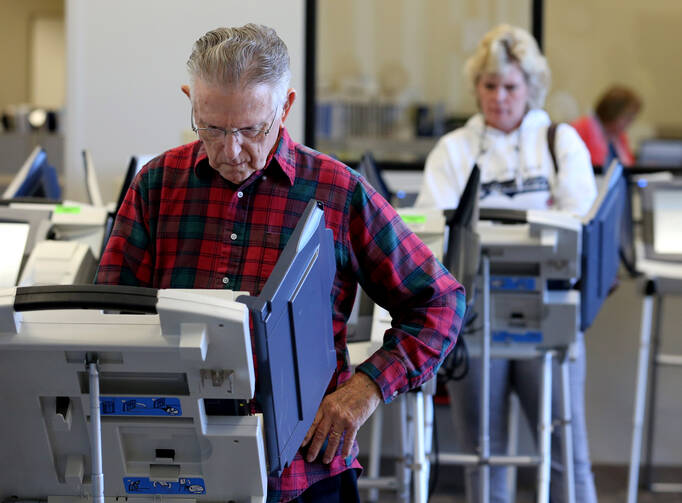With the 2016 presidential election just a day away, candidates Donald J. Trump and Hillary Clinton are making their finals pushes for the presidency. Many Catholics, like other voting groups, find themselves caught between the polarized candidates.
Meanwhile, The Catholic Vote: A Catholic Grassroots Movement is working to keep Catholic voters informed about where each candidate stands on issues important to the Catholic Church.
Last week, the group published “The Catholic Vote,” a guide to help Catholic voters understand where the candidates stand on more than 35 key issues.
The topics covered include abortion, torture, religious liberty, sustainable agriculture, the death penalty and welfare policy.
“The Catholic Vote” gathered quotes from the candidates and corresponded them to subjects raised in "Forming Consciences for Faithful Citizenship," the U.S. bishops’ statement on voting, and other church documents, including encyclicals and pastoral letters.
For each issue, the group asked if the candidate’s views align with church teaching, and they were ranked yes, no or inconclusive.
The findings about both candidates’ stances were “inconclusive” on a number of church issues, said Trevor Gundlach, the project creator.
“Many students have...voiced their surprise at how neither party is ‘truly Catholic’ and that voting as a Catholic cannot be linked to one single political party,” Mr. Gundlach said. “Being Catholic means voting Catholic, according to all of the issues.”
RELATED: Catholics Help Clinton Maintain Lead in New Poll
Meaghan Crowley, another project member at the University of Dayton, said the process and intent behind “The Catholic Vote” differentiates it from other religious voting guides because the group examined each candidate's platform through the lens of “Faithful Citizenship.” This process allowed the group to remain non-partisan.
The group determined Clinton’s views align with 28 of the USCCB topics, disagree on six and are “inconclusive” on three. Trump is in line with nine of the topics, disagrees with 15 and is inconclusive on 13.
Finding direct quotes from candidates on many of the issues was more difficult than the organizers’ first thought, Crowley said.
For example, Clinton has stated support for faith-based groups but opposed the Supreme Court decision to exempt certain corporations from the Affordable Care Act contraception mandate. So it was difficult to rank her on “Recognition and support to faith-based groups,” and she was thus ranked inconclusive on this topic.
Trump has stated a desire to re-implement “stop and frisk” police tactics but has otherwise not spoken about reforming the criminal justice system. So he was ranked inconclusive for “Reforming the broken criminal justice system.”
Both candidates are in line with church teaching on “Valuing, protecting, and nurturing children” and “Improving the earned income tax credit and child tax credits.” They both disagree with church teaching on the topic “avoid war and promote peace.”
Mr. Gundlach started the project in January and was motivated to see its completion after giving a talk in September about the problems with single-issue voting. Catholics need to be thorough when making political decisions, he said, because there is more than one issue in the election important to Catholics, a point Ms. Crowley also emphasized.
“Our hope for this resource is to provide Catholics with all of the information they need to make their own informed and prayerful decision,” Ms. Crowley said. “Using the resource as a way to prayerfully weigh the issues, and vote with all of the issues in mind.”
Wyatt Massey is an O'Hare Fellow at America.








